Bread has been a staple in Mediterranean cultures for millennia, and choosing whole grain, sourdough, or ancient grain bread aligns best with the Mediterranean diet. These options provide higher fiber, nutrients, and long-lasting energy, making them both healthy and historically authentic choices. You can eat up to 2 slices a day for weight loss.
History of Bread in the Mediterranean Region
You can eat bread on the Mediterranean diet, but the type of bread you choose is important for maximizing health benefits. The Mediterranean diet emphasizes whole, minimally processed foods, so naturally, whole-grain bread is best suited for this eating pattern.
Best Types of Bread for the Mediterranean Diet
Whole Grain Bread: This is the best option because it’s made from whole grains containing bran, germ, and endosperm, providing more fiber, vitamins, and minerals than refined white bread. Whole grains help stabilize blood sugar and are linked to reduced risks of heart disease and obesity.
Sourdough Bread: Sourdough is traditionally made with fermented dough, which improves digestibility and nutrient absorption. It also has a lower glycemic index compared to white bread. I love it due to its unique taste! [BUY ON AMAZON]
Bread with Seeds: Bread enriched with seeds (such as flaxseeds, sesame seeds, and sunflower seeds) offers additional healthy fats, fiber, and protein. This aligns with the Mediterranean diet’s emphasis on healthy fats from plant sources.
Einkorn, Spelt, or Barley Bread: These ancient grains are closer to the original grains used in the Mediterranean region and are often more nutrient-dense than modern refined wheat varieties. They offer more fiber and minerals like magnesium, selenium, and zinc.
Types of Bread in Ancient Mediterranean Civilizations
Ancient Egypt: The Egyptians were among the first to develop leavened bread, thanks to the discovery of wild yeast in their environment. Bread was a staple in their diet and was often made from emmer wheat (an ancient grain) or barley. Emmer is a type of wheat that is more nutritious than modern wheat, being rich in fiber and micronutrients.
Ancient Greece: The Greeks consumed a variety of breads, often made from barley (which was more common than wheat), spelt, and sometimes millet. Bread was central to the Greek diet and came in different forms, some coarse and dense, and others finer, for wealthier citizens.
Ancient Rome: Romans initially ate a barley-based bread, similar to the Greeks. However, during the Roman Empire, wheat became the most popular grain. Bread was a staple of the Roman diet, with a wide variety of loaves baked daily. Roman soldiers, in particular, were known to eat bread made from spelt, an ancient grain that was hearty and nutritious.
Levant (Eastern Mediterranean): In this region, flatbreads like pita and lavash were staples, and they were often made from wheat or barley. These breads were baked quickly and could be eaten fresh or stored for longer periods. They were often paired with dips like hummus or olive oil, which remain common in the Mediterranean diet today.
History of Bread in the Mediterranean Region
Bread has deep cultural and historical significance in the Mediterranean, dating back thousands of years. The warm climate and fertile land made the Mediterranean basin ideal for cultivating grains, particularly wheat and barley. Grains were ground into flour and made into flatbreads or leavened breads, depending on the yeast and baking methods available.
In ancient Egypt, bread was so important that it was often used as currency.
The Greeks took bread-making to a higher level of artistry, experimenting with different grains and baking techniques, creating hundreds of different varieties.
The Romans industrialized bread production, building bakeries and creating different styles, from flatbreads to more complex leavened breads. Bread played a significant role in social life, becoming a symbol of wealth and prosperity.
Throughout the Middle Ages, bread continued to be a vital food in the Mediterranean. Whole grain bread was a staple for the poorer classes, while white bread, made from refined wheat, became a luxury for the wealthy.[1]

Best Types of Bread for Health
Whole Grain Bread: Rich in fiber and nutrients, helps to maintain stable blood sugar, and promotes heart health.
Sourdough: Fermented naturally, easier to digest, and has a lower glycemic index.
Ancient Grain Bread (Spelt, Emmer, Einkorn): These grains are more nutritious than modern wheat and less processed, aligning with traditional Mediterranean practices.
Calorie Content
All types of bread have a similar calorie content.
White bread has 267 calories per 100g. A medium slice of white bread has about 73 calories while two slices have fewer than 150 calories! So, reasonable amounts of bread won’t make you fat.
Whole wheat bread has a similar calorie content, containing about 254 calories per 100g or 70 calories per slice.
All breads have a similar calorie content:
- multi-grain bread has 265 calories per 100g
- rye bread has 259 calories per 100g
- barley bread has 274 calories per 100g
- oatmeal bread has 269 calories per 100g
- potato bread has 266 calories per 100g
- rice bread has 248 calories per 100g
- bread with seeds has about 306 calories per 100g
- gluten-free bread from rice flour or corn starch has about 248 calories per 100g.
A medium slice of bread (27 grams) has between 67 and 83 calories. A large slice (40 grams) has between 102 and 126 calories!
How Many Slices of Bread Per Day for Weight Loss?
In the Mediterranean diet, bread can certainly be included, even if you are aiming for weight loss. However, the type of bread, portion control, and what you eat with the bread play crucial roles in determining whether it supports or hinders your weight loss efforts.
- Sedentary Individuals: 1 slice per day.
- Moderately Active Individuals: 1-2 slices per day.
- Athletes or Highly Active Individuals: 2-3 slices per day.
The idea is to balance your overall caloric intake.
While bread is allowed, it should be consumed in moderation and preferably as whole grain or whole wheat to maximize fiber and nutrient intake.
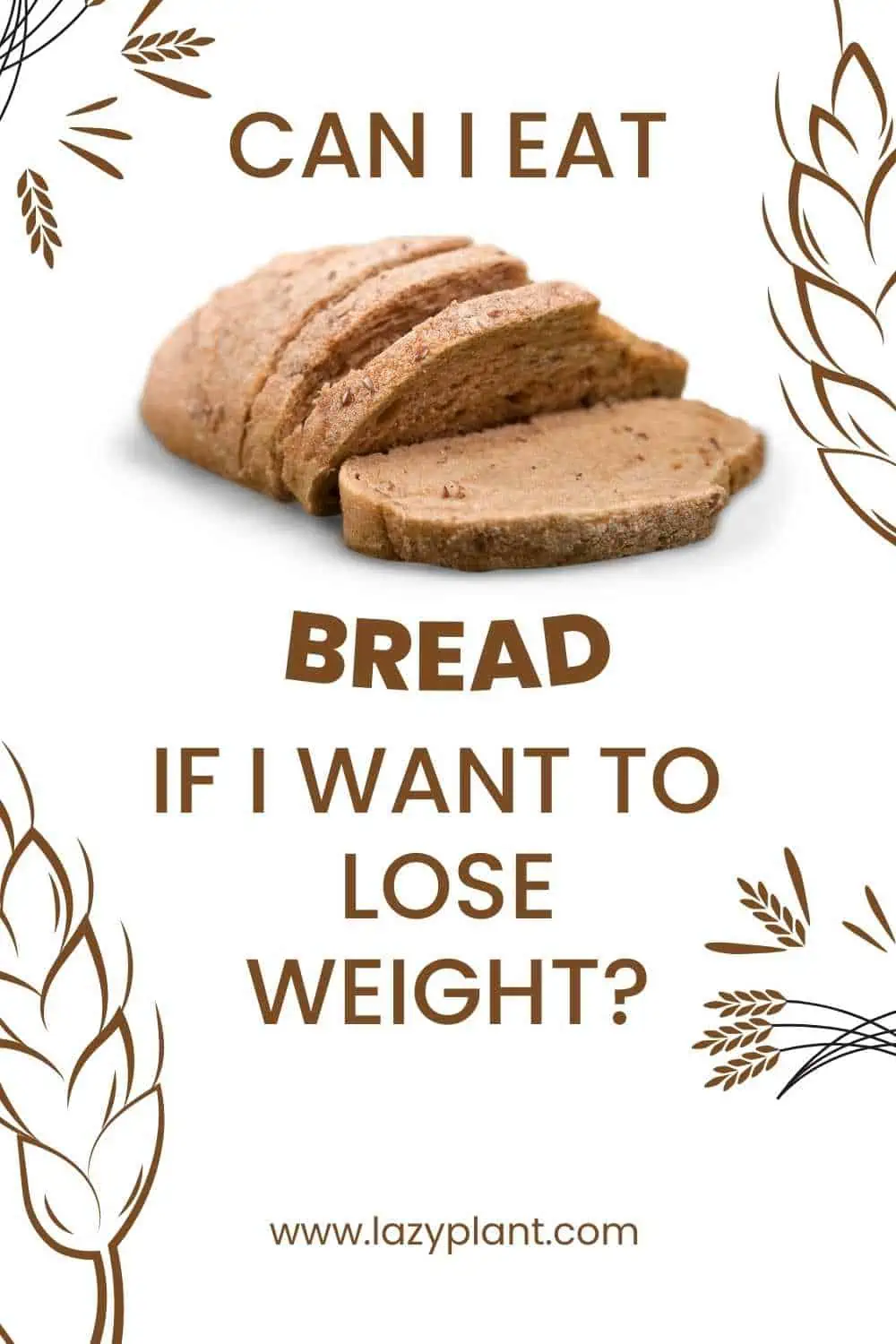
Factors Influencing Bread Intake for Weight Loss:
- Age: As people age, their metabolism naturally slows, meaning they require fewer calories. Older adults should aim for smaller portions of bread, about 1 slice per day, unless they’re highly active.
- Gender: Men generally have higher energy needs due to more muscle mass and faster metabolism, so they can typically eat more bread (2 slices daily) without compromising weight loss goals.
- Activity Level: Those with more physical activity burn more calories and can afford slightly more bread in their diet. For athletes or people engaging in intense workouts, 2-3 slices of whole grain bread per day can fit into a weight loss plan.
- Type of Bread: Whole grain bread is rich in fiber and nutrients, making it more filling and better suited for weight loss compared to white bread. Fiber slows digestion, helping with appetite control, which is key in a calorie-restricted diet.
Considerations for Toppings and Spreads
Bread alone is not the problem for weight loss, but what you put on it can make a difference. For example:
- Nutella (2 tbsp): 200 calories
- Tahini (2 tbsp): 167 calories. My favorite spread. Tahini is one of the healthiest foods you can eat daily!
- Olive oil (1 tbsp): 120 calories
- Mayonnaise (2 tbsp): 190 calories
These calorie-dense spreads can turn a simple slice of bread into a high-calorie snack that can interfere with weight loss. Instead, opt for lighter toppings like:
- Hummus: Nutrient-dense and lower in calories.
- Mustard: Virtually calorie-free.
- Tomato slices with a drizzle of olive oil: A Mediterranean staple that adds minimal calories.
A single slice of bread (especially whole grain) is not inherently bad for weight loss. A slice of whole-grain bread contains roughly 70-90 calories, which can easily fit into most calorie-restricted diets. However, combining it with high-calorie spreads or eating multiple slices without considering your daily caloric intake can lead to weight gain.
What’s the Healthiest Bread?
Whole Grain
Whole-grain bread is has the highest nutritional value. Just a medium slice of whole wheat bread provides:
- manganese, 27% DV. Μanganese levels are significantly lower in obese people. High manganese intake has been reported to have beneficial effects in reversing metabolic dysfunction including obesity.[2]
- selenium, 13% DV. Adequate levels of selenium appear to have protective effects against obesity as well. As it’s a key component of powerful antioxidant compounds, selenium may protect from many chronic diseases. The richest food in selenium is Brazil nuts. Just nut provides more selenium than the daily value! You can add chopped nuts to your favorite bread snack.[3]
- phosphorus, 8% DV. Foods high in phosphorus and carbs such as bread help burn belly fat. It significantly enhances energy expenditure after a meal.[4]

- copper, 7% DV. A diet low in copper may cause fat accumulation. Eating foods rich in copper like whole grain bread can reduce Body Mass Index.[5]
- calcium, 5% DV. Getting adequate amounts of calcium is essential for weight loss. It inhibits the formation of new fat tissue while increasing thermogenesis!
- magnesium, 5% DV. A diet rich in magnesium supports weight loss. Among others, it’s involved in glucose metabolism.
- iron, 5% DV. Iron deficiency is the most prevalent single micronutrient deficiency and it has been closely linked to an increased risk of obesity. Among others, it may lead to fatigue and eventually low energy burn.
- zinc, 4% DV. Zinc as part of a calorie-restricted diet may control appetite and improve insulin sensitivity.
Seed bread
Whole-grain bread with seeds is also beneficial for weight loss, despite, their high-calorie content. Pumpkin, sunflower, and flax seeds support weight loss, as they’re particularly high in minerals and compounds that are involved in energy metabolism:
- pumpkin seeds are the richest seeds in iron and one of the richest foods in potassium.
- sunflower seeds are good dietary sources of iron, zinc, vitamin B6, and vitamin E.
- flax seeds are one of the richest common foods in omega-3s.
White bread
White bread may have:
- less fiber and minerals than whole-grain bread
- added sugar and preservatives
- high glycemic index of 75. Just for comparison, table sugar has a glycemic index of 84. Too much white bread can spike blood sugar levels.[6]
Sandwiches and toast may be bad for weight loss as well, as in most cases, they’re made of low-quality white flour.
What’s the Sugar content of common types of bread?
Most types of bread naturally contain between 1 and 3 grams of sugar per slice! Many commercial breads have added sugar, though. On average, white bread contains 5.34 grams of sugar per 100g.
Sprouted wheat bread has the lowest amount of sugar, with less than 1 gram of sugar per slice!
| starch | fiber | sugar | sugar (grams per slice) | |
|---|---|---|---|---|
| raisin | 38 | 2.5 | 11.3 | 3.2 |
| potato | 31 | 6.3 | 9.4 | 3 |
| oatmeal | 36 | 4 | 8.1 | 2.3 |
| barley | 38 | 4 | 5.7 | 1.6 |
| white | 37 | 2.3 | 5.3 | 1.5 |
| whole wheat | 29 | 6 | 4.4 | 1.4 |
| rice bran | 43 | 4.9 | 4.7 | 1.3 |
| rye | 38 | 5.8 | 3.9 | 1.2 |
| sprouted wheat | 26 | 5.3 | 2.6 | 0.9 |
The main sugar type in bread is fructose.
Bread affects blood sugar levels. It’s particularly rich in carbs. Especially starch.
Even whole-grain bread significantly affects blood glucose. Although these types of bread are richer in dietary fiber and minerals, they increase the blood glucose levels of diabetic patients as white bread.[7]
Sourdough bread results in lower glucose responses.[8,9]
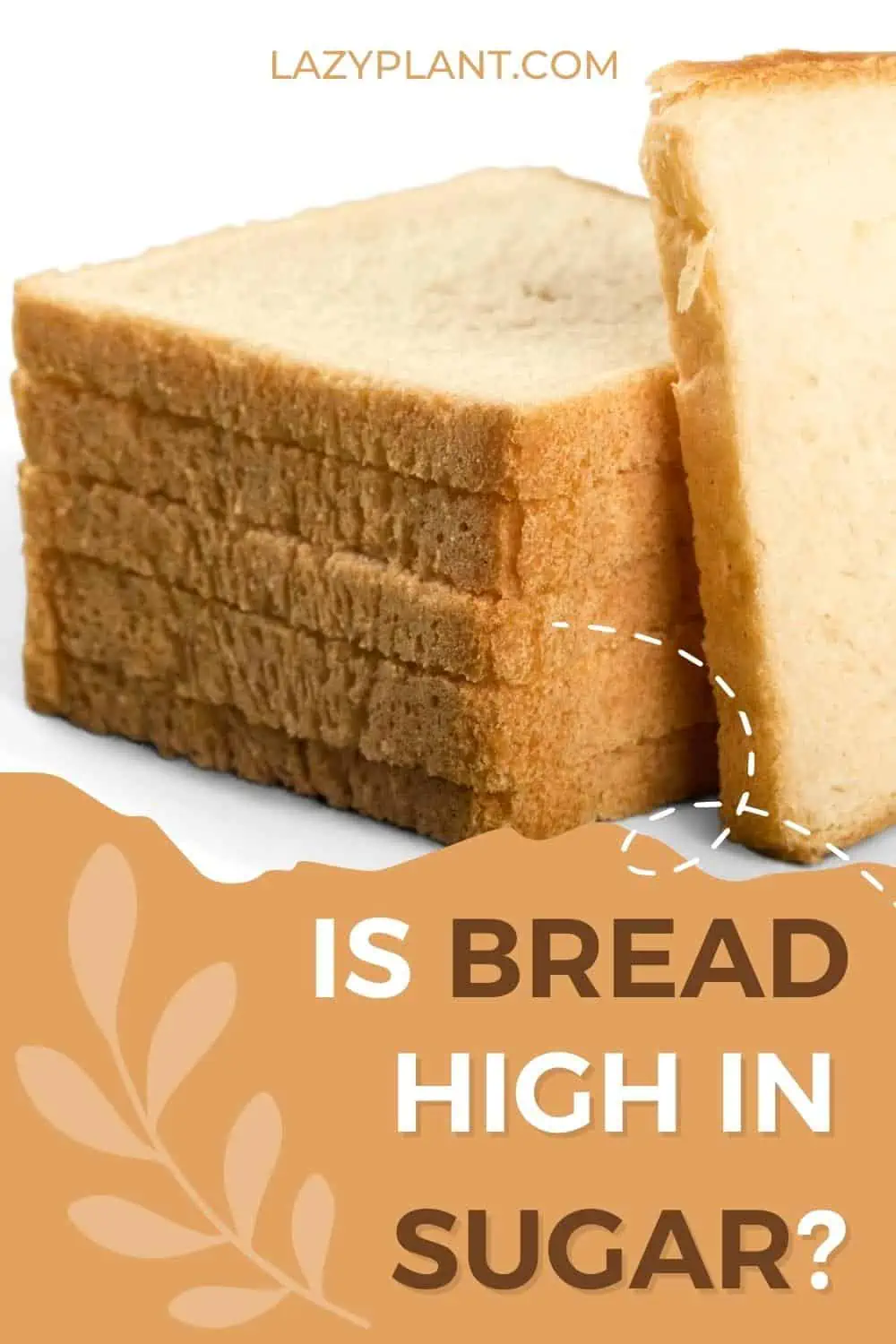
Fiber Content
The fiber in whole-grain breads promotes digestive health, helps regulate blood sugar, and supports weight loss by enhancing satiety.
White bread is a poor source of fiber, containing only 0.6 grams per medium slice, which amounts to just 2% DV. In contrast, whole-grain bread offers a much higher fiber content, with a medium slice providing around 2 grams of fiber, or 7% DV.
Whole-grain seed breads are particularly rich in fiber, with up to 7.4 grams per 100 grams. These breads have about three times more fiber than white bread, making them a superior choice for those looking to increase their fiber intake.
Bread is an excellent Calcium source
Bread can be a good source of calcium, which is essential for bone health and can support weight loss by aiding fat metabolism and promoting thermogenesis.
In the Mediterranean diet, whole grain breads such as wheat and potato bread are excellent options for calcium intake. Potato bread contains up to 188 mg of calcium per 100g, providing about 9% of the daily recommended value per large slice. Whole wheat bread follows closely.
| calcium (mg per 100g) | calcium (mg per small slice) | % DV | calcium (mg per large slice) | % DV | |
|---|---|---|---|---|---|
| potato | 188 | 51 | 5% | 90 | 9% |
| wheat | 163 | 44 | 4.4% | 78 | 7.8% |
| rice | 138 | 37 | 3.7% | 66 | 6.6% |
| barley | 125 | 34 | 3.4% | 60 | 6% |
| rye | 73 | 20 | 2% | 35 | 3.5% |
| oat | 66 | 18 | 1.8% | 32 | 3.2% |
| raisin | 66 | 18 | 1.8% | 32 | 3.2% |
| banana | 21 | 6 | 0.6% | 10 | 1% |
Consuming calcium-rich bread, along with other Mediterranean diet staples like leafy greens and nuts, can help meet daily calcium needs. This is particularly important since calcium plays a role in regulating body weight by reducing fat absorption and supporting fat breakdown.
However, the bioavailability of calcium in bread can vary, especially in whole grain varieties, which contain compounds like phytates that may inhibit absorption. For optimal calcium intake, combining bread with other high-calcium, low-oxalate foods is beneficial.
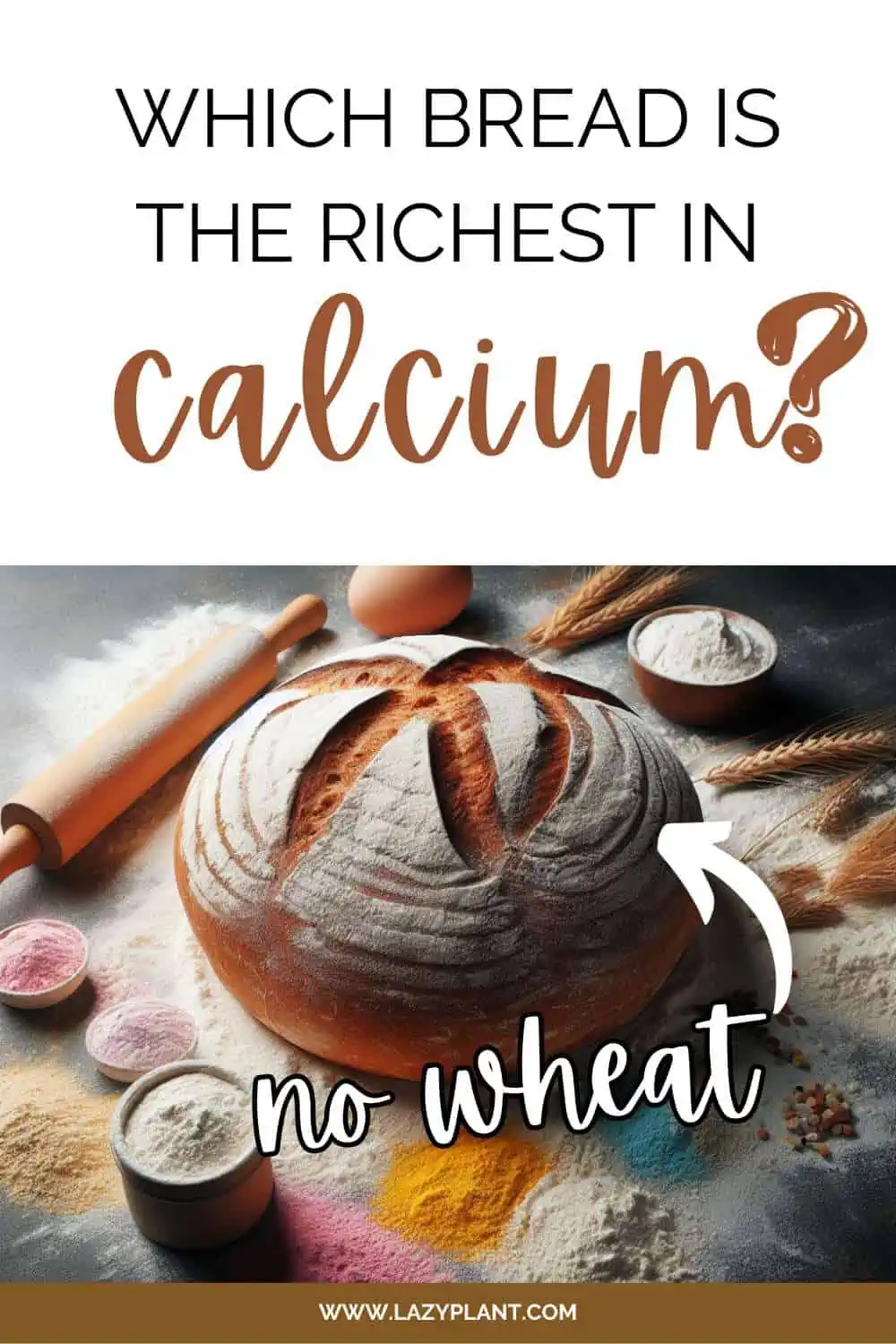
Why am I always starving unless I grab a bite of bread?
Feeling consistently hungry unless you eat bread could be influenced by a few factors.
Firstly, bread varieties made from refined flour provide easily digested carbs which provide a quick source of energy. Consuming them can initially satisfy hunger. However, this effect may be short-lived.
These refined carbs can cause rapid spikes and subsequent crashes in blood sugar levels. After eating bread, you may experience a temporary feeling of fullness, but the subsequent drop in blood sugar levels could trigger hunger again. So, you always seek carbohydrate-rich foods, like white bread.
Keep in mind that if you rely on bread as a primary source of calories, your eating patterns and choices may be influencing your hunger. A diet lacking in diverse nutrients and food groups can lead to increased hunger.
Certainly, there could be psychological factors at play, such as associations between bread and comfort or satisfaction. Emotional or stress-related eating patterns might contribute to a perceived need for bread. In this case, bread can make you gain weight.
When should Eat Bread for Weight Loss?
Bread, when incorporated mindfully into the Mediterranean diet, can be a valuable tool for weight loss, providing essential nutrients and energy at various times of the day.
At breakfast
Eating bread, especially whole grain or seeded varieties, for breakfast provides a steady source of energy to kickstart your day. Whole grain breads are rich in complex carbohydrates and fiber, which help stabilize blood sugar levels, reducing cravings and overeating later in the day. It helps the body produce serotonin, a compound that regulates appetite.
In the morning, the body has increased glucose sensitivity, meaning that it effortlessly stores net carbs as glycogen in the muscles.
Pairing bread with healthy fats (like olive oil or avocado) or protein (such as eggs or Greek yogurt) can keep you full longer and prevent mid-morning hunger. This balanced approach can support weight loss by reducing the urge to snack on unhealthy options.
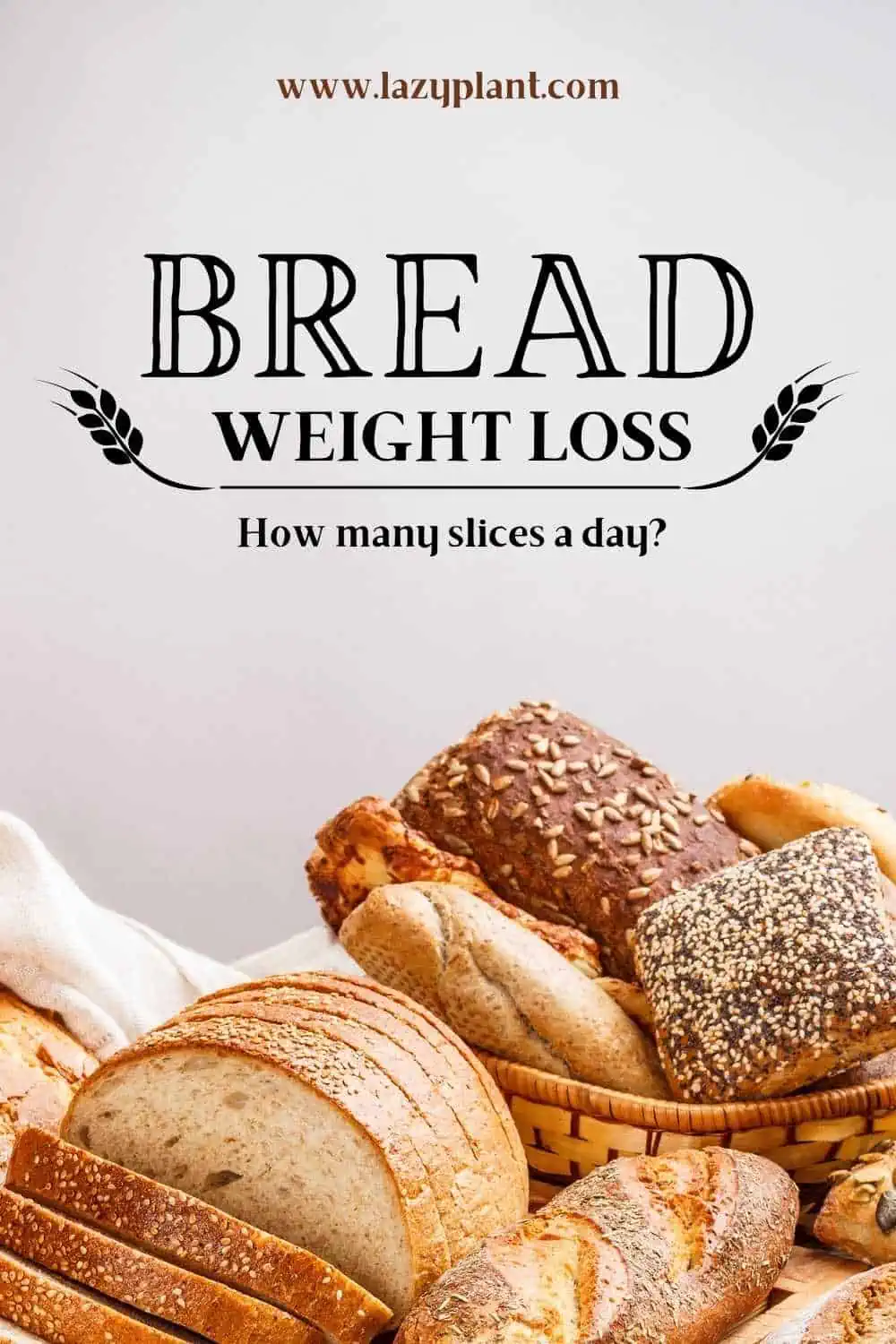
Between Meals
Including bread as part of a small, balanced snack between meals can help prevent overeating during main meals. Whole grain bread or bread with seeds offers fiber, which promotes satiety and helps curb cravings. Choosing a slice of whole grain bread with a low-calorie spread, like hummus or a small amount of nut butter, can satisfy hunger without adding excess calories.
Before Bed
Bread can be a satisfying addition to dinner when paired with vegetables, lean proteins, and healthy fats, a common structure in the Mediterranean diet.
Opting for a slice of whole grain or rye bread at dinner can help you feel more satisfied with smaller portions, thanks to its fiber content. Fiber-rich breads can also support digestion and prevent late-night cravings, both important for weight management.
After exercise
Eating bread after exercise, particularly white bread, can provide specific benefits that aid in faster recovery and support a lean body, especially for athletes or those engaging in high-intensity workouts.
White bread is rich in easily digestible carbohydrates with a high glycemic index (GI), meaning it quickly spikes insulin levels and replenishes muscle glycogen stores that are depleted during exercise. This quick restoration of glycogen is critical for athletes who need to recover quickly and maintain high levels of performance.
Although whole-grain bread is more nutritious, white bread’s lower fiber content makes it more suitable after exercise because it doesn’t slow down digestion, allowing for faster nutrient absorption.
Consuming white bread along with protein sources, such as in a peanut butter sandwich or a turkey sandwich, can further enhance muscle recovery and growth by providing a balanced mix of fast-acting carbs and protein.
Combining white bread with antioxidant-rich foods like berries or healthy fats like avocado can also improve recovery and reduce oxidative stress caused by intense physical activity.
Incorporating white bread post-exercise supports muscle recovery, replenishes energy levels, and, when paired with balanced nutrients, can aid in maintaining a lean physique. However, for the rest of the day, whole-grain breads are preferred for overall health and longer-lasting energy.

How to Eat Bread for Weight Loss?
Toasting
Toasting bread can have several effects, but its impact on weight loss is generally minimal.
Toasting bread doesn’t significantly alter its caloric content. The process only removes some water content, but the calorie difference is negligible.
As a matter of fact, toasting may slightly increase the glycemic index of bread, potentially leading to a quicker spike in blood sugar levels. However, this effect is generally modest and may vary depending on the type of bread.
Some individuals find that toasted bread is more satisfying than untoasted bread, though. The crunchiness and change in texture might contribute to a feeling of fullness.
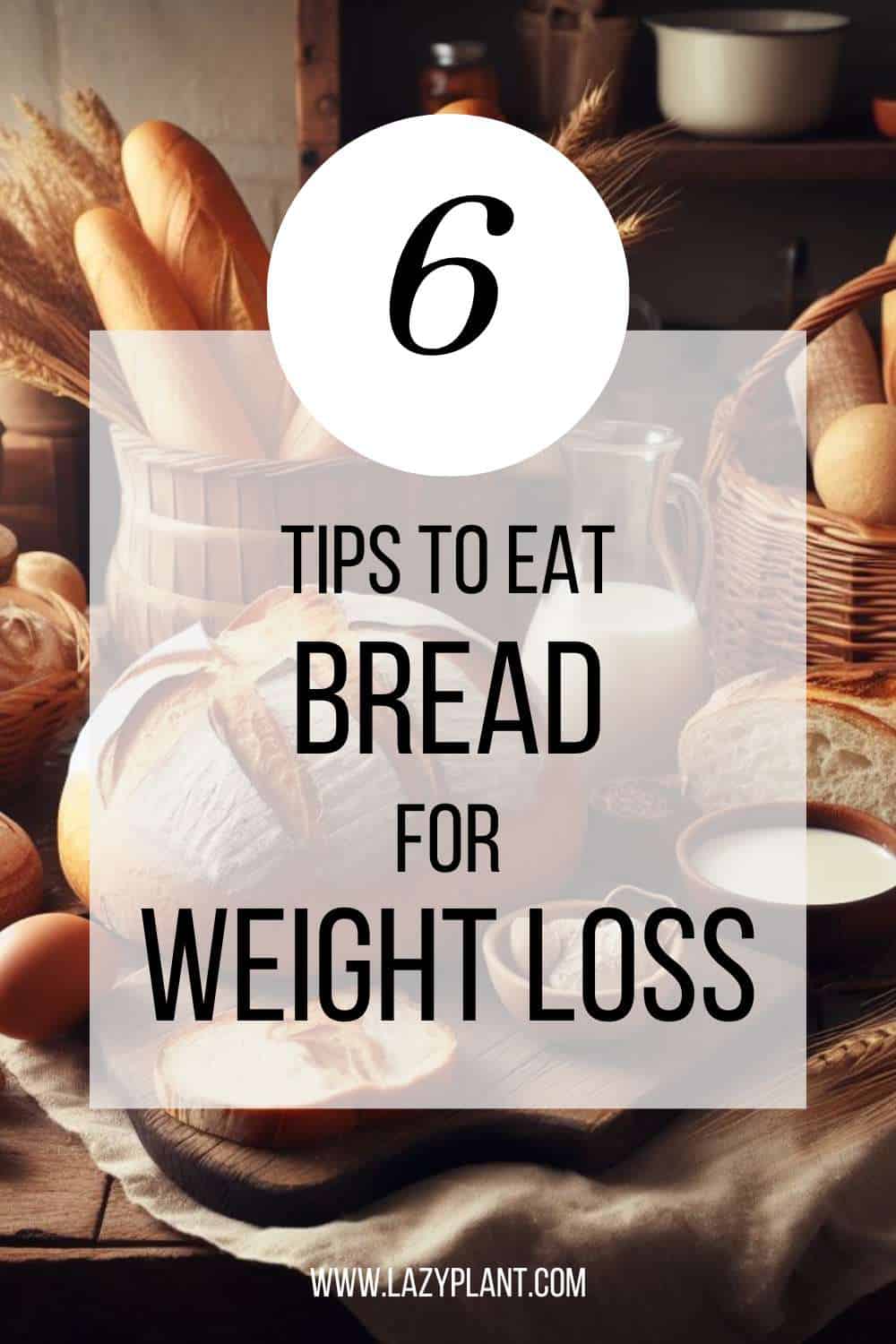
Toasting can enhance the flavor of bread, making it more appealing to some individuals. Enjoying your food can positively impact your overall eating experience and satisfaction.
In addition, toasting breaks down the starches in bread, making it easier to digest for some people. This can be beneficial for those who experience digestive discomfort with untoasted bread.
Certainly, the toppings and spreads you add to your toasted bread can have a more significant impact on weight loss. Even choosing healthier options like avocado, nut butter, or lean protein that contribute to a more balanced meal can make you gain weight, as they have too many calories.
With a Protein Source
There is no need to eat bread with butter or any other fattening spread. It’s always a good idea to incorporate protein in your meals if you’re on a diet.
Protein protects the precious muscle mass while following a hypocaloric diet. Minimizing the loss of muscle mass is crucial for a lean body and an increased metabolism.
Also, protein in combination with fiber, which is found abundant in whole-grain bread, promotes satiety, helping stick to a calorie-low diet for a long time.
Last, but not least, protein has the highest thermic effect. We burn between 20 and 30% of calories of protein during digestion!
Healthy Mediterranean Recipe Ideas with Bread
Here are 13 quick and healthy recipes that incorporate 1-2 slices of bread with at least one protein source for weight loss. These recipes provide a good balance of protein, fiber, and healthy fats to support your weight loss goals.
- Turkey and Veggie Sandwich: Layer lean turkey slices on whole wheat bread. Add crisp lettuce, tomato, and cucumber. Spread mustard or hummus for extra flavor.
- Calories: 250-350
- Protein: 15-20g
- Carbs: 25-35g
- Fat: 8-12g
- Chicken Salad Sandwich: Combine shredded grilled chicken with Greek yogurt, diced celery, and a touch of mustard. Spread on whole grain bread and add lettuce.
- Calories: 300-400
- Protein: 20-25g
- Carbs: 20-30g
- Fat: 10-15g
- Hummus and Veggie Sandwich: Spread hummus on whole wheat bread and layer with cucumber, bell peppers, and spinach. Add a protein boost with grilled chicken.
- Calories: 200-300
- Protein: 8-12g
- Carbs: 25-35g
- Fat: 8-12g
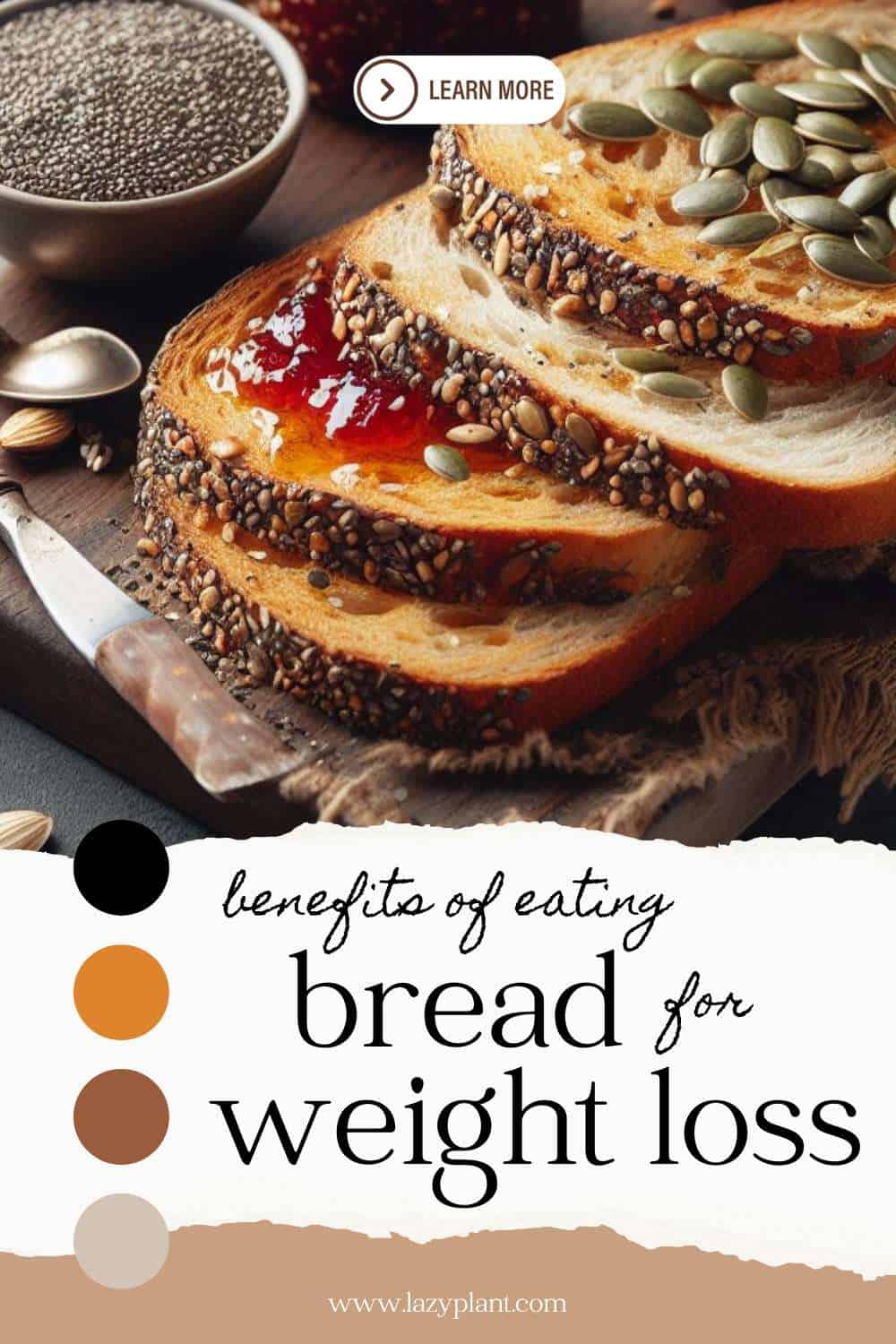
- Egg Salad on Rye: Mix hard-boiled eggs with Greek yogurt, mustard, and chives. Spread on rye bread and top with arugula.
- Calories: 200-300
- Protein: 10-15g
- Carbs: 20-25g
- Fat: 10-15g
- Smoked Salmon and Cream Cheese Bagel Thin: Spread light cream cheese on a whole grain bagel thin and top with smoked salmon, capers, and red onion slices.
- Calories: 300-400
- Protein: 15-20g
- Carbs: 25-35g
- Fat: 12-18g
- Chicken Pesto Sandwich: Mix shredded chicken with pesto and spread on whole grain bread. Top with sliced cherry tomatoes.
- Calories: 300-400
- Protein: 20-25g
- Carbs: 20-30g
- Fat: 12-15g
Vegetarian Recipe Ideas
- Caprese Toast: Layer tomato and mozzarella slices on whole wheat bread. Drizzle with balsamic glaze and sprinkle with fresh basil.
- Calories: 200-300
- Protein: 8-12g
- Carbs: 20-30g
- Fat: 10-15g
- Greek Yogurt and Berry Toast: Spread Greek yogurt on whole wheat bread and top with mixed berries. Sprinkle with a hint of granola for added crunch.
- Calories: 200-300
- Protein: 10-15g
- Carbs: 25-35g
- Fat: 8-12g
- Avocado Toast with Poached Egg: Top whole grain toast with mashed avocado and a poached egg. Sprinkle with salt, pepper, and optional chili flakes.
- Calories: 200-300.
- Protein: 10-15g
- Carbs: 15-25g
- Fat: 10-15g
- Peanut Butter Banana Toast: Spread natural peanut butter on whole grain bread and top with sliced banana. Drizzle with a touch of honey.
- Calories: 250-350
- Protein: 8-12g
- Carbs: 30-40g
- Fat: 12-18g
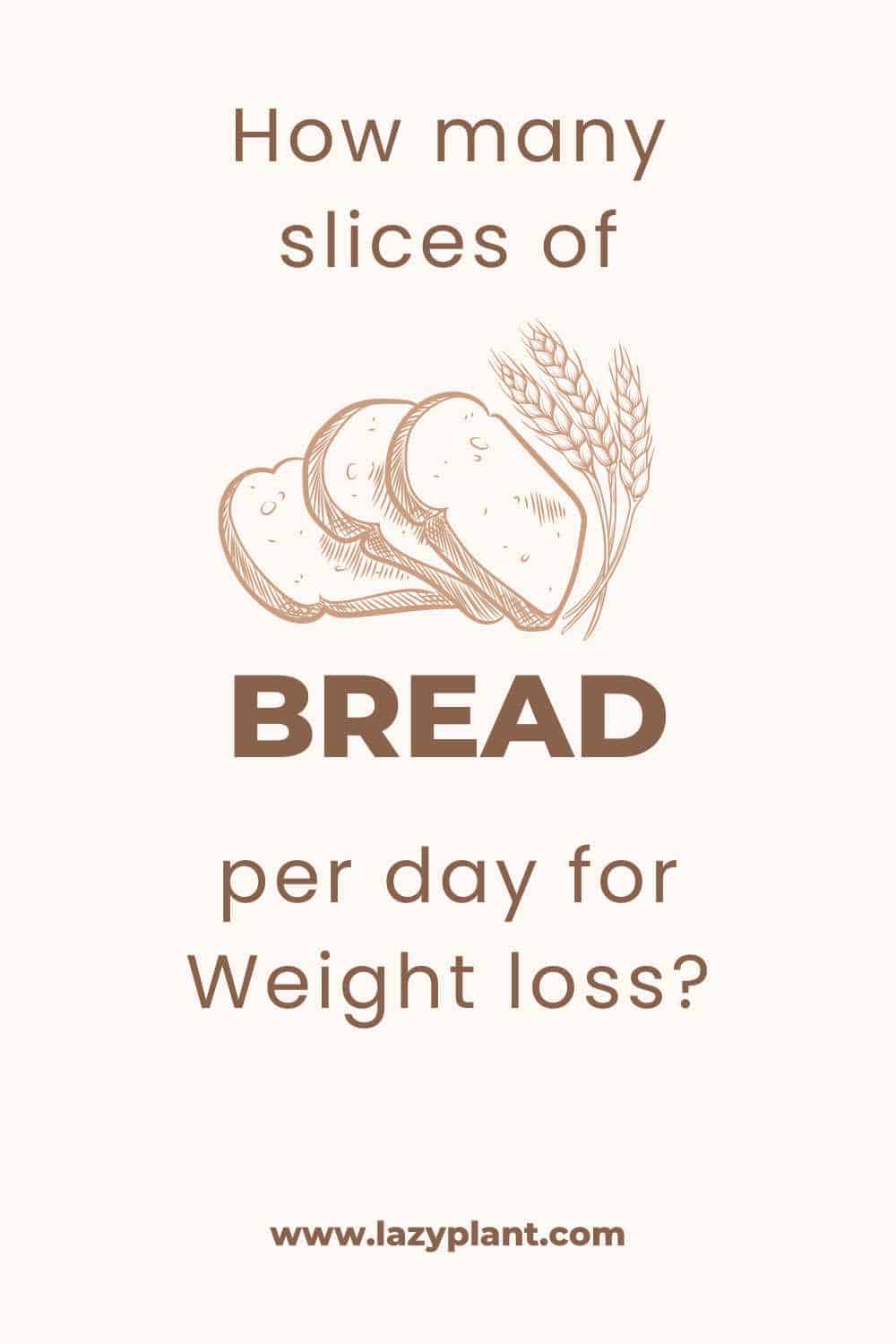
Vegan Recipe Ideas
- Chickpea Salad Sandwich: Mash chickpeas with avocado, lemon juice, and spices. Spread on whole grain bread and top with cucumber and sprouts.
- Calories: 250-350
- Protein: 10-15g
- Carbs: 25-30g
- Fat: 12-15g
- Tofu and Vegetable Open Sandwich: Sauté tofu with mixed vegetables and place on whole grain bread. Drizzle with tahini and sprinkle with sesame seeds.
- Calories: 250-350
- Protein: 12-18g
- Carbs: 25-35g
- Fat: 10-15g
- Black Bean and Avocado Wrap: Mash black beans with avocado, lime juice, and cumin. Spread on a whole grain wrap and add lettuce, tomato, and salsa.
- Calories: 300-400
- Protein: 12-18g
- Carbs: 30-40g
- Fat: 12-18g
Remember to adjust portion sizes based on your individual dietary needs and preferences.